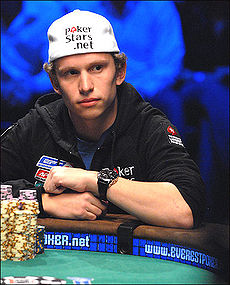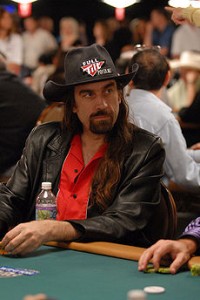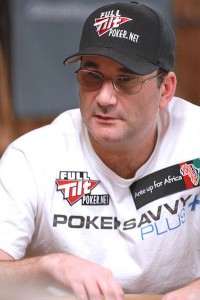Jul 19 2010
The Short but Successful Poker Career of Peter Eastgate
written by: John Comments: Comments Off
 Twenty Great Months
Twenty Great Months
It has been two years since Peter Eastgate became the World Series of Poker Main Event winner. In 2008, the first place champion won a $9,152,416 prize and became the first in Denmark’s all-time money list beating Gus “The Great Dane” Hansen, who has cashed five times in various WSOP events in the past and whose highest place in the Main Event was 61st place in 2007. Eastgate also broke Phil “The Poker Brat” Hellmuth’s record for youngest WSOP Main Event winner at the age of 24. Eastgate was the first 22-year-old to sport a WSOP Main Event bracelet.
His Early Days
Poker was just a way to pass time while Eastgate was in college. He soon, however, found that he had a talent. He once logged on to online poker sites to play for cash. When he started winning large amounts of cash, he decided to leave school and pursue poker full-time. He was studying finance at the time and has said he would like to return to finish college someday.
Since Sharkscope has now provided the general public with a way to track all wins AND losses of any player, there is no doubt about who wins and loses. Sharkscope was traditionally a tracker of only online wins and losses, and they only recorded data from SNGs and tournaments. Now, however, Sharkscope keeps full records for all live tournaments as well. With the WSOP running almost parallel to this new release, it was the perfect storm for Sharkscope. There is little doubt that they saw subscription rates go through the roof, if only from curious by-standers.
There was some controversy over Sharkscope making these statistics available in their database, but it is clear that they do not care. After all, if players can track online wins and losses, why shouldn’t they be able to track live wins and losses? There is no massive list of wins and losses for live players to research, so it can be argued that something like this was almost needed. No matter what some people might think, it seems virtually unanimous that this was a major change for the better. For the three top poker players listed below, however, the ability to track live tournament wins and losses could not have come at a more unfortunate time.

#1-Chris Ferguson – $221,473
Chris Ferguson is one of the best tournament poker players in the world, but his 2010 WSOP is evidence of just how much variance there is in the game. He has said many times that it is nearly impossible to gain a significant amount of data when estimating or calculating a live MTT player’s earnings. Many players luckbox one event and will have a positive ROI for the rest of their life. Needless to say, this certainly does not mean that they are a winning player. Ferguson is not going to lose much respect after his tumultuous World Series, but he certainly isn’t going to gain a whole lot either.
Online poker has allowed the game of poker to grow at a faster pace than ever before. There are so many advantages to playing online vs. live that it just doesn’t make sense to play live anymore. For some players, though, the only option was to play on the internet. After the Moneymaker boom in 2003, young, and often first time, players around the world made their own poker accounts. Many of these players would go on to donate their bankrolls one deposit at a time, while others went on to become the superstars of poker. Tom Dwan, Phil Galfond, and Andrew Robl are just the beginning of top players who got their start online, and new players are starting every single day.
These three players are certainly an exception to the rule, but they show how far the game of poker has come over the past 10 years. Even a decade ago, poker rooms were filled with middle aged and older players, whereas now there is almost always a 20 something at each and every table. Online poker has made the games tougher, but it has done wonders for the popularity of the game as a whole.
Poker has plenty of winners, but there is no shortage of losers, either. There is all kinds of variance in this game, and players often go broke multiple times in a single year. Now, if the player practiced solid bankroll management and was truly a good player, this would almost never happen. As we all know, though, there is a lot of degenerate gamblers amongst the poker playing crowd. Some of the most well known TV pros are also the biggest gamblers, both on and off the felt. Do you think Phil Ivey stops gambling when the cameras are turned off? Absolutely not, in fact, that is when he really starts to play. For certain players, gambling is just in their blood, but unfortunately this often results in a drained bankroll.
#1-Mike Matusow

How can Matusow not be at the top of this list? He has a storied past, much of which involves gambling and general degenerate tendencies. He passed up on an opportunity to invest in Full Tilt Poker so that he could place some big sports bets, all of which he lost. If that isn’t the prime example of a gambler, I don’t know what is. Aside from all of this, Mike’s skills have taken a turn for the worst over the past few years. He complained about his terrible 2009, and was, of course, pinning the blame on many other people.
In tournaments, your stack is often going to be dwindled down to virtually nothing. This is nothing more than the nature of tournament poker, and sometimes there is nothing you can do about it. What you can do, however, is play the short stack as close to perfection as possible. There are, for all intents and purposes, three moves that become viable as a tournament progresses. Players can either fold, go all in, or call off their stack. Making a call of a raise while leaving an insignificant amount of chips behind is typically a terrible play. So too is raising anything less than the entirety of your stack when the blinds are high. Why? Because by making an all in raise, you are simplifying your post flop strategy, and, more importantly, putting your opponent to a tough decision.
The more chips that you raise with, the more likely you are to force a fold. In the later stages of a tournament, folds are often just as good as calls, even when you are holding a strong hand. The blinds become so large that one round of blinds can move you up the payout ladder. There are going to be plenty of times where a shove is going to be called by a superior (or inferior) hand that ends up beating us, but you can’t win them all. Make the best play available and things will work out. This is the unfortunate aspect of tournaments. Sometimes you have no choice but to go all in, even if it is far from the most relaxing play.




Comments Off - Click Here to Speak Up